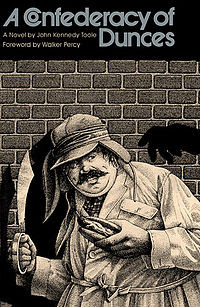A professor recommended A Confederacy of Dunces to me a million years ago so, since I now have a sizable commute on Mondays, Wednesdays and Fridays, I put it on my iThing (it's an iPod, but I've named it "iThing"), so that I could listen to it on my way to school.
I promise, I didn't know this before I started listening to it, but Walker Percy wrote the foreword! Percy writes that mother of the author (John Kennedy Toole) brought the book to Percy's attention some years after Toole's death.
A Confederacy of Dunces is a picaresque novel that is so over-the-top that it puts Don Quixote to shame. Almost everyone in the book (with the possible exception of Gus Levy of Levy Pants and Claude, Mrs. Reilly's suitor) is a ridiculous cartoon caricature. The main character, Ignatius J. Reilly, is an immensely obese man-child who is caught up in Medieval philosophy (it was great fun to read this book while I am teaching Medieval philosophy). He is constantly critiquing the contemporary world from a Medieval standpoint--he constantly refers to Fortuna and her cycles. On the other hand, he is caught up in a fascination with precisely the thing he critiques. The book follows Reilly on his pursuit of a job--he first works as a filer at Levy Pants, then at a hot dog stand, accidentally smuggling pornography.
Ignatius' mother, Irene Reilly, drinks too much (she keeps her wine in the oven, which leads to Ignatius making lots of funny comments about her baking wine). There is a mistreated black man who is forced to work in a club as a janitor. There is a pathetic policeman who is the brunt of his department's jokes. There is a Freudian woman, Myrna Minkoff, who corresponds with Ignatius and wants to fix him. There is Gus Levy's wife who tries to psychoanalyze Miss Trixie, one of the employees at her husband's business. Miss Trixie is ancient and dying to retire, but Mrs. Levy is convinced that she needs to keep working in order to feel valuable. There is Darlene, who wants to be a stripper at the club with the help of her bird.
The book follows loads of different characters, their stories all intersecting repeatedly and tightly. Toole is best at the way that he gradually reveals his characters' true personalities. You see them the way that they see themselves first. Then you see the way that other characters perceive them. You aren't quite sure who to believe at that point. Then, you see them through their own actions.
I really cannot recommend the book on tape version. It took me a good five minutes of listening to be sure that the narrator was not a computer. He puts on a Southern accent, but his voice just sounds digitized. He affects many different accents throughout the course of the novel. The thing is the book just plain isn't politically correct--there is one character who is flamboyantly gay, for instance. This isn't helped by the way that the reader reads the book out loud. I would recommend reading it to yourself if you read it, and not listening to someone else read.
I guess I'm also slightly confused about Ignatius' love of Boethius' Consolation of Philosophy: Ignatius is obsessed with the book, but he sees himself as being controlled by the force of Fortuna. He does not believe himself to have much influence over his fortune. But I read Boethius to say that fortune is irrelevant--he says at one point that all fortune is good (from God's perspective); from the human perspective, all fortune that happens to good people is good, and all fortune that happens to wicked people is wicked (not because God rewards people neatly for their actions, but because good people can be made better through either misfortune or fortunate occurrences and because wicked people are at least given an experience of justice when they are punished). Which is to say, I understand Boethius to be removing fortune's power, but Ignatius seems to see everything that happens to him as the result of fortune.
I suppose the whole book comes down to the epigraph from Jonathan Swift, from which the title of the book is taken: "When a true genius appears in the world, you may know him by this sign, that the dunces are all in confederacy against him." Is Ignatius the genius that he thinks he is, with everyone uniting against him? Or is he the crazy man that his mother and her friends think that he is? Almost certainly, he's a little bit of both and a little more crazy than genius.


No comments:
Post a Comment